Discover golf cart battery comparison between lead-acid and lithium-ion golf cart batteries. Find out which option best suits your needs based on performance, lifespan, and maintenance considerations\
Introduction
In the realm of golf carts, selecting the right battery is crucial for optimal performance and longevity. This article delves into the nuances of golf cart batteries, comparing different golf cart batteries and brands to help you make an informed decision.
1. Types of different golf cart batteries
Golf carts primarily utilize two main types of batteries, each with its own set of characteristics and benefits:
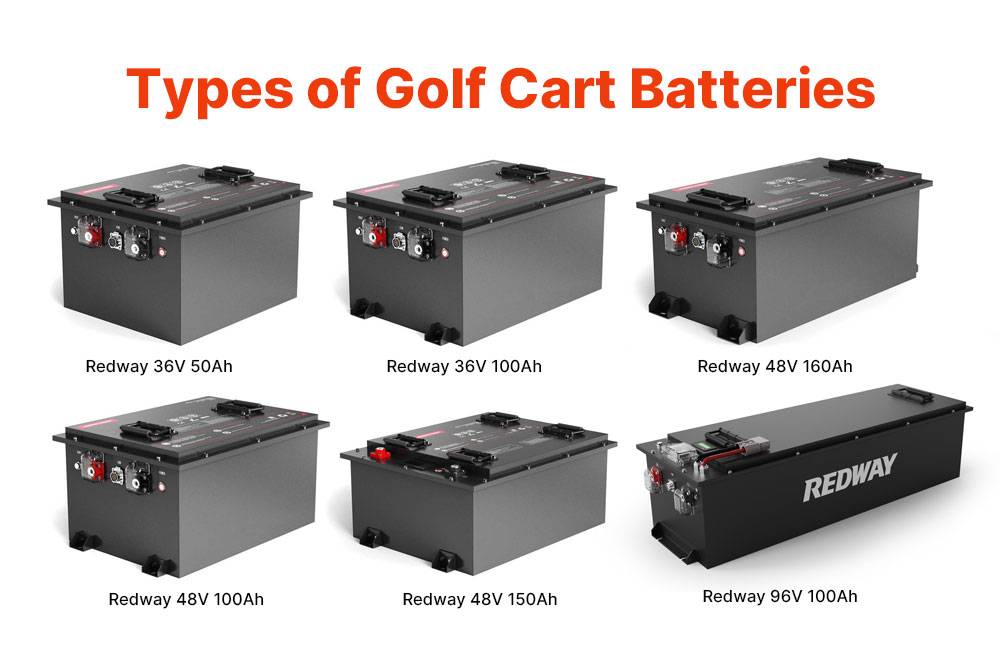
Different golf cart batteries
1.1. Lead-Acid Batteries:
One of different golf cart batteries is Lead-acid batteries. Those have been a staple in the golf cart industry for decades due to their reliability and affordability. They are typically classified into two subtypes: flooded lead-acid (FLA) and sealed lead-acid (SLA) batteries. FLA batteries require periodic maintenance such as checking water levels and ensuring proper ventilation. SLA batteries, on the other hand, are maintenance-free and sealed, making them easier to handle and install. Lead-acid batteries are known for their robustness and ability to handle deep discharge cycles, making them suitable for both recreational and utility golf carts.
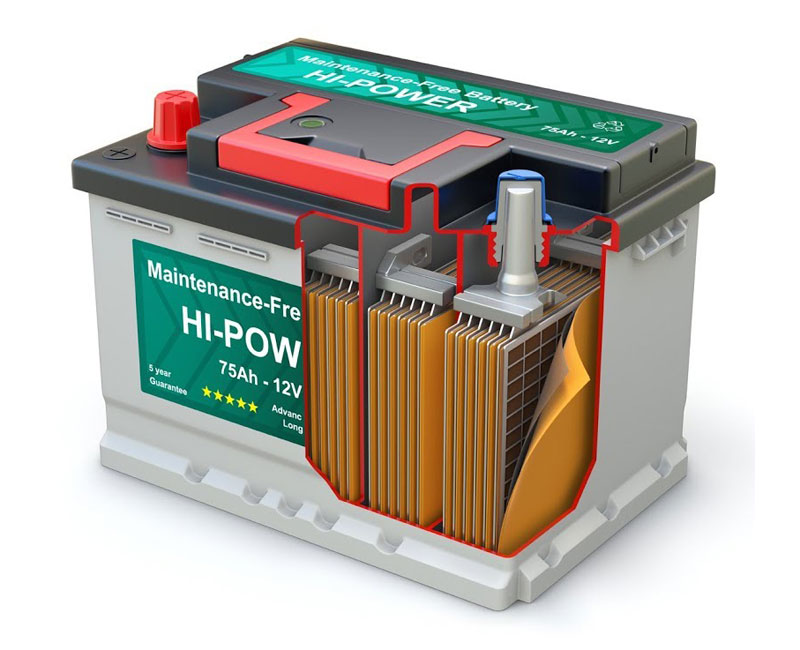
Lead-Acid Batteries Golf cart battery comparison
1.2. Lithium-Ion Batteries:
Another different golf cart batteries is Lithium-ion batteries which represent the cutting edge in golf cart battery technology. They are lightweight, compact, and offer higher energy density compared to lead-acid batteries. Lithium-ion batteries are known for their longevity, often lasting three to five times longer than lead-acid batteries. They require minimal maintenance and can be charged more quickly. Despite their higher upfront cost, lithium-ion batteries provide significant advantages in terms of performance, efficiency, and lifespan, especially in demanding applications where weight and space are critical factors.
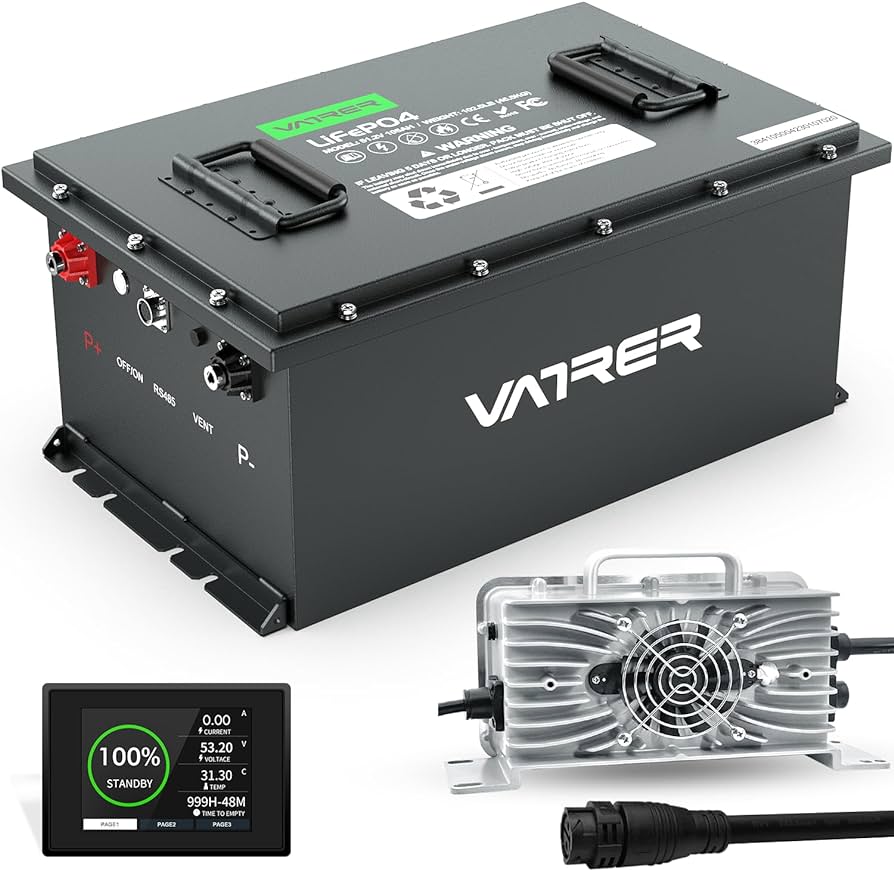
Different golf cart batteries Lithium-Ion Batteries
2. Factors to Consider in golf cart battery comparison
When evaluating golf cart batteries, several key factors should be considered to determine which type best suits your needs:
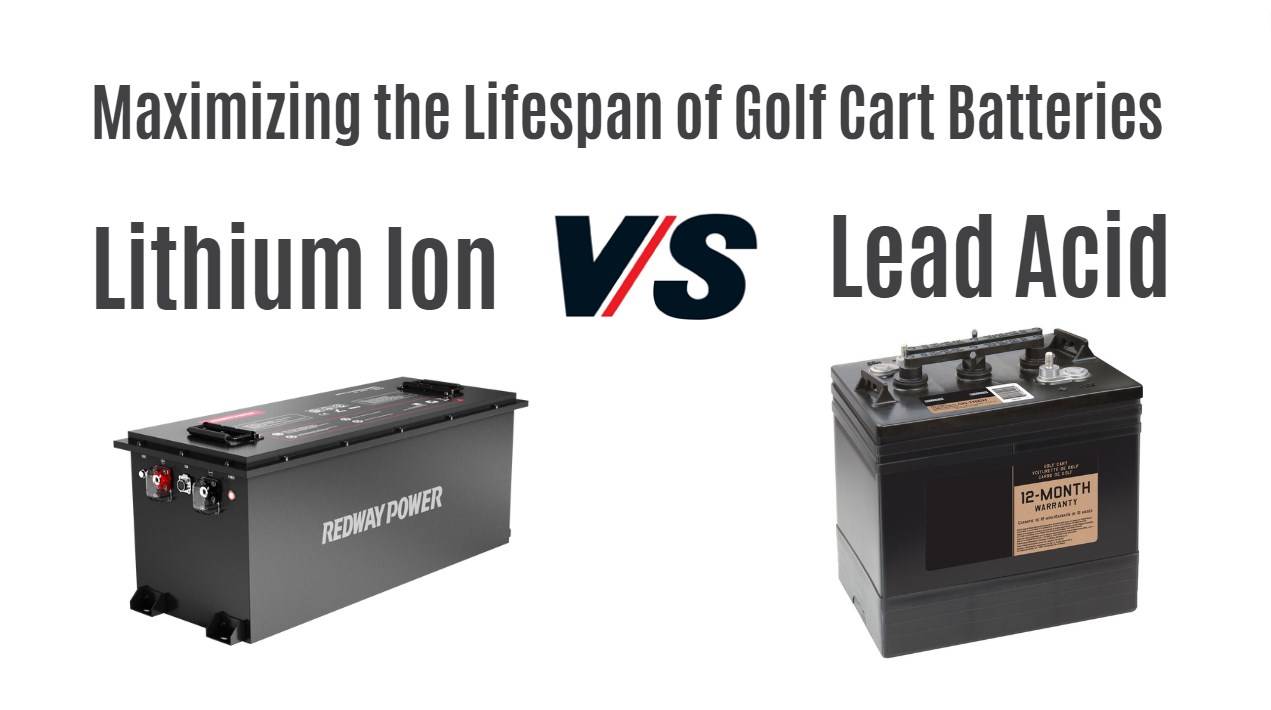
Golf cart battery comparison
2.1. Lifespan:
In golf cart lithium battery comparison, lithium-ion batteries typically outlast lead-acid batteries, offering up to 10 years of service life compared to 3-5 years for lead-acid batteries. This longer lifespan reduces the frequency of battery replacements and associated costs over time.
2.2. Performance:
Lithium-ion batteries provide consistent power delivery throughout the discharge cycle, maintaining performance even as the charge level decreases. In contrast, lead-acid batteries experience voltage sag as they discharge, impacting overall performance.
2.3. Maintenance Requirements:
Lead-acid batteries require regular maintenance such as checking water levels, cleaning terminals, and ensuring proper ventilation to prevent sulfation. In golf cart lithium battery comparison, lithium-ion batteries are virtually maintenance-free, eliminating the need for periodic maintenance tasks.
2.4. Environmental Impact:
Lithium-ion batteries have a lower environmental impact due to their longer lifespan, reduced weight, and recyclability. Lead-acid batteries, while recyclable, require careful handling of lead and sulfuric acid during disposal or recycling.
3. Golf cart battery comparison: Lead-Acid Batteries
Lead-acid batteries remain popular due to their affordability and widespread availability. They are suitable for golfers who prioritize initial cost savings and are willing to perform routine maintenance tasks. Lead-acid batteries come in various configurations to accommodate different golf cart batteries models and usage requirements.
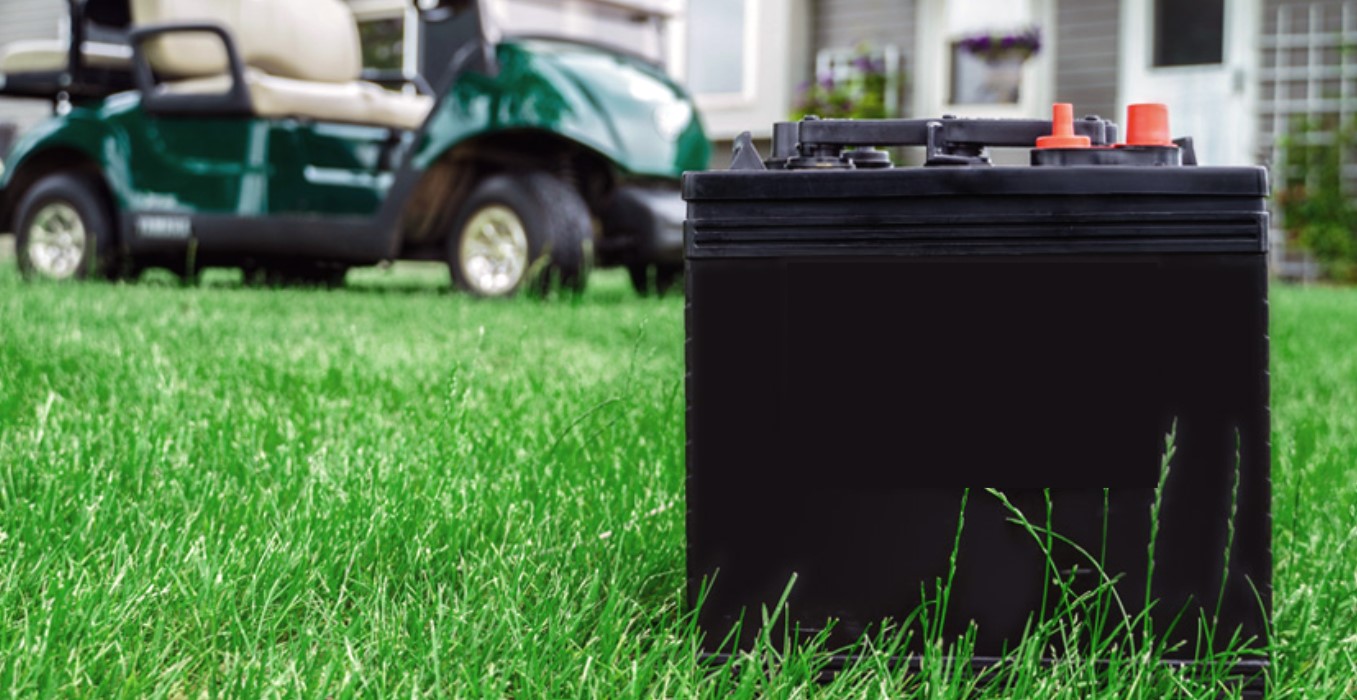
Golf cart battery comparison
- Advantages: Cost-effective initial investment, reliable performance in moderate climates, and compatibility with existing charging infrastructure.
- Disadvantages: Limited lifespan compared to lithium-ion batteries, maintenance-intensive, and heavier weight impacting vehicle efficiency.
4. Golf cart battery comparison: Lithium-Ion Batteries
In golf cart lithium battery comparison, lithium-ion batteries offer superior performance characteristics that appeal to golf cart users seeking enhanced efficiency and reliability. They are lighter, more compact, and capable of delivering consistent power output over a longer period without voltage sag.
- Advantages: Long lifespan, lightweight design, fast charging capabilities, high energy efficiency, and minimal maintenance requirements.
- Disadvantages: Higher initial cost, specialized charging requirements, and potential for safety concerns if mishandled.
5. Who Makes the Best Golf Cart Batteries?
Several manufacturers are renowned for producing high-quality golf cart batteries:
5.1. Trojan Battery Company:
Known for their durable and reliable lead-acid batteries tailored for golf cart applications. Trojan batteries are widely recognized for their deep-cycle performance and longevity.
5.2. E-Z-GO:
Offers a range of batteries designed specifically for their golf cart models, ensuring compatibility and optimal performance.
5.3. Lithium Battery Manufacturers:
Who makes the best golf cart batteries with Various brands specializing in lithium-ion batteries, each offering unique features such as fast charging, high energy density, and extended lifespan is Manufacturers like RELiON, Battle Born Batteries, and SimpliPhi Power are notable in the lithium-ion battery market for golf carts.
6. Golf cart battery comparison: Key Features of a Good Golf Cart Battery
When selecting a golf cart battery, consider these essential features to ensure reliability and longevity:
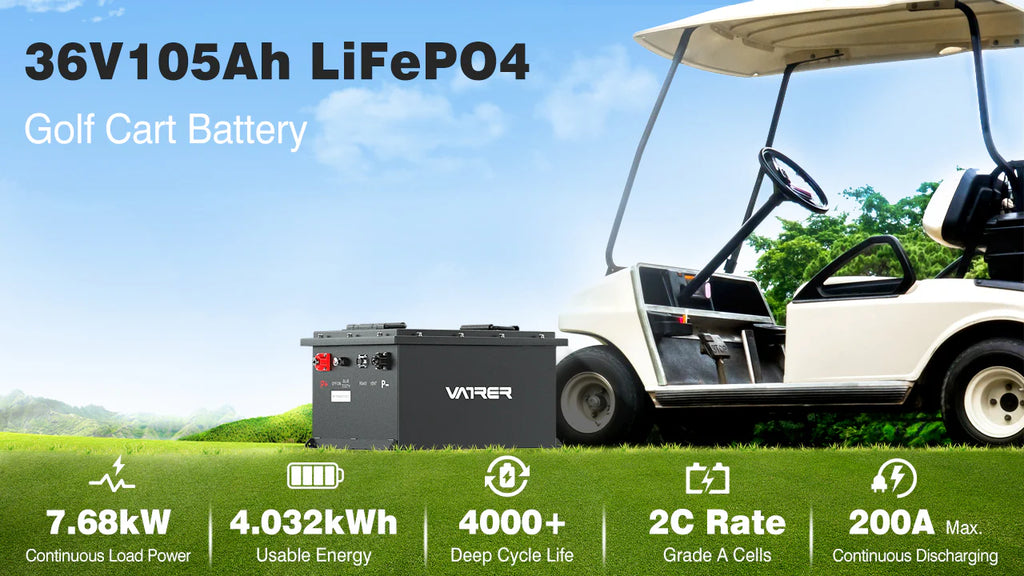
Golf cart battery comparison: Key Features of a Good Golf Cart Battery
- Durability: Ability to withstand frequent charge-discharge cycles without significant performance degradation.
- Efficiency: Provides consistent power output and energy efficiency to maximize the driving range of the golf cart.
- Compatibility: Designed to fit seamlessly with various golf cart models and charging systems, ensuring reliable operation without compatibility issues.
This expanded outline provides a detailed overview of golf cart battery types, factors influencing battery selection, golf cart battery comparison between lead-acid and lithium-ion technologies, prominent manufacturers, and essential features to consider.
Conclusion
Choosing the best golf cart battery involves weighing factors like lifespan, performance, maintenance, and initial cost against long-term savings and efficiency. By understanding these differences, you can make a well-informed decision that enhances your golfing experience.
Explore more about golf cart batteries, golf cart battery comparison options, and consult with experts to find the ideal battery for your specific needs. Make a purchase that aligns with your budget and performance expectations to maximize your enjoyment on the course.

Hello everyone, my name is Robert Chambers. I have a deep passion and enthusiasm for all things related to battery technology, particularly for golf carts. Over the past twenty years, I’ve dedicated myself to exploring and understanding the intricacies of this field. My goal is to share my knowledge and insights with you through this website: Best Battery for Golf Carts
I’ve spent countless hours researching, testing, and optimizing batteries to ensure you get the best performance out of your golf carts. My experience both on the technical side and as an avid golfer has given me a unique perspective that I’m excited to share.
Whether you’re looking to extend the life of your golf cart batteries, find the best options available, or simply want to learn more about how they work, I’m here to help. My mission is to make the complex world of battery technology accessible and understandable for everyone.
Thank you for joining me on this journey. Let’s dive into the fascinating world of golf cart batteries together!

